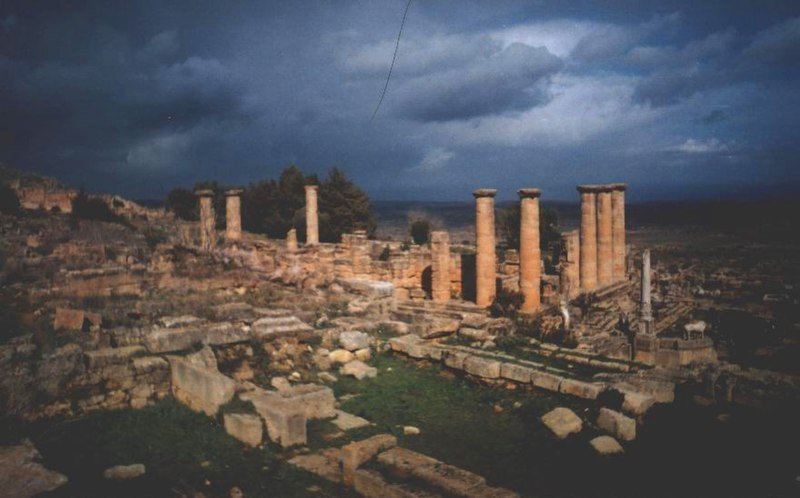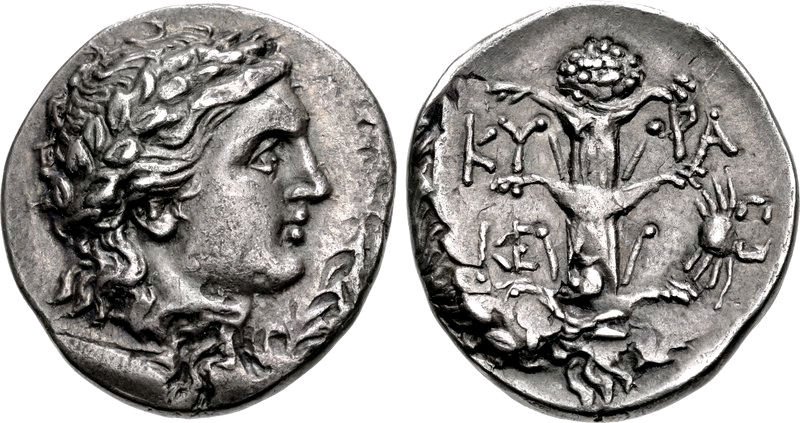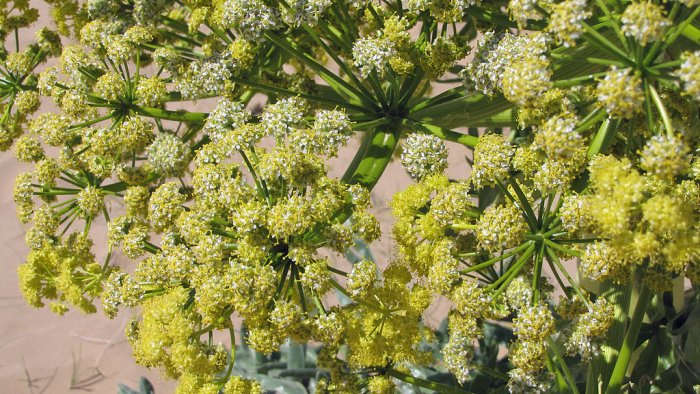Silphium – Remarkable Ancient Herb That Mysteriously Vanished
Ellen Lloyd - AncientPages.com - Once, a long time ago, there was a very precious herb in the ancient city of Cyrene, a Greek city on the North African coast near present-day Shahhat, a town located in northeastern Libya.
According to one legend, Silphium was first discovered after a “black” rain swept across the east coast of Libya over two and a half millennia ago. The herb spread its broad roots ever further from then onwards, growing luxuriantly on lush hillsides and forest meadows.
Ancient ruins of Cyrene. Credit: Wikimedia Commons - CC BY-SA 3.0
In time, ancient people discovered that the herb known as silphium was amazing in several ways. Silphium was so delicious and useful that the plant became very valuable.
Ancient cultures used silphium for medical applications, and the plant could help with several health problems.
According to Roman author Pliny, the Elder repeated fumigations with the root could be used to treat bites of feral dogs as well as problems related to growths of the anus.
Silphium had a wonderful smell. The perfume was coaxed from its delicate blooms while its sap was dried and grated liberally over dishes from brains to braised flamingo. Known as “laser,” the condiment was fundamental to Roman haute cuisine as eating your food horizontally in a toga.
Silphium was so fundamental to Cyrene's economy. The locals stamped its image on their money. Image credit: Classical Numismatic Group, Inc - CC BY-SA 3.0
Ancient people placed it in the bedroom where its juice was drunk as an aphrodisiac or applied “to purge the uterus.”
Some scholars have suggested the herb was the first genuinely effective birth control. The seeds of the herb are heart-shaped, and some think this could be why we associate the symbol with romance to this day.
Ancient Romans were so fond of Silphium that they referenced their darling herb in poems and songs. The herb was also mentioned in great works of literature.
For centuries, local kings held a monopoly on the plant, which made the city of Cyrene, at modern Shahhat, Libya, the richest in Africa. Before they gave it away to the Romans, the Greek inhabitants even put it on their money. Julius Caesar even went to store a cache (1,500lbs or 680kg) in the official treasury.
There are many reasons why Silphium was worth its weight in gold.
Sadly, Silphium has vanished. Not only from the region but our planet altogether.
Pliny The Elder wrote that within his lifetime, only a single stalk was discovered. It was plucked and sent to the emperor Nero as a curiosity sometime around 54-68 AD.
Silphium is thought to have been a close relative of asafoetida. Image credit: Valery Fassiaux - Public Domain
Why Silphium vanished is unknown. Perhaps the plant was over-harvested and overgrazed. Its own biology may have also undermined it.
Interestingly, scientists discovered that asafoetida silphium might have belonged to a group of fennel-like plants, the Ferula.
These plants are related to carrots and grow wild as weeds across North Africa and the Mediterranean.
Incredibly, two of these plants – giant Tangier fennel and giant fennel – still exist in Libya today. One of these may be Silphium.
Maybe it’s still possible to re-discover the lost ancient plant Silphium.
Written by Ellen Lloyd – AncientPages.com
Copyright © AncientPages.com All rights reserved. This material may not be published, broadcast, rewritten or redistributed in whole or part without the express written permission of AncientPages.com
More From Ancient Pages
-
 5000-Year-Old Cold Case: Neolithic Fisherman Died By Drowning – Forensic Study Shows
Archaeology | Feb 14, 2022
5000-Year-Old Cold Case: Neolithic Fisherman Died By Drowning – Forensic Study Shows
Archaeology | Feb 14, 2022 -
 Did The Viking Blood Eagle Ritual Ever Happen Or Was It A Misunderstood Story?
Archaeology | Dec 21, 2021
Did The Viking Blood Eagle Ritual Ever Happen Or Was It A Misunderstood Story?
Archaeology | Dec 21, 2021 -
 The Olmecs – Who They Were, Where They Came From Still Remains A Mystery
Civilizations | Feb 19, 2015
The Olmecs – Who They Were, Where They Came From Still Remains A Mystery
Civilizations | Feb 19, 2015 -
 Could Shipworms Be Destroying The Wreck Of Captain Cook’s Endeavour?
Archaeology | Aug 18, 2022
Could Shipworms Be Destroying The Wreck Of Captain Cook’s Endeavour?
Archaeology | Aug 18, 2022 -
 Police Forces That Kept Order In Ancient Streets
Ancient History Facts | Jun 12, 2018
Police Forces That Kept Order In Ancient Streets
Ancient History Facts | Jun 12, 2018 -
 On This Day In History: King Tut’s Tomb Is Unsealed And Opened – On Feb 16,1923
News | Feb 16, 2017
On This Day In History: King Tut’s Tomb Is Unsealed And Opened – On Feb 16,1923
News | Feb 16, 2017 -
 World’s Oldest Mosaics Of Biblical Jonah And The Whale Discovered
Archaeology | Jul 23, 2017
World’s Oldest Mosaics Of Biblical Jonah And The Whale Discovered
Archaeology | Jul 23, 2017 -
 Hammurabi: The Great King Of Babylon And His Laws
Civilizations | Oct 21, 2016
Hammurabi: The Great King Of Babylon And His Laws
Civilizations | Oct 21, 2016 -
 Mictlan – Underworld Realm Of The Dead In Ancient Aztec Beliefs
Aztec Mythology | Jul 2, 2018
Mictlan – Underworld Realm Of The Dead In Ancient Aztec Beliefs
Aztec Mythology | Jul 2, 2018 -
 Knights Templar’s Legendary Sword In Stone In Terminillo Mysteriously Disappeared – Where Is It Hidden?
Featured Stories | May 3, 2021
Knights Templar’s Legendary Sword In Stone In Terminillo Mysteriously Disappeared – Where Is It Hidden?
Featured Stories | May 3, 2021 -
 Fate Of The Woman Whose Mysterious Doppelgänger Ruined Her Life
Featured Stories | Mar 6, 2023
Fate Of The Woman Whose Mysterious Doppelgänger Ruined Her Life
Featured Stories | Mar 6, 2023 -
 Long-Lost Anglo-Saxon Monastery Ruled By Queen Cynethryth Of Mercia Discovered By Archaeologists
Archaeology | Aug 19, 2021
Long-Lost Anglo-Saxon Monastery Ruled By Queen Cynethryth Of Mercia Discovered By Archaeologists
Archaeology | Aug 19, 2021 -
 DNA Reveals – One Of Sunken Warship Vasa’s Crewmen Was A Woman
Archaeology | Apr 4, 2023
DNA Reveals – One Of Sunken Warship Vasa’s Crewmen Was A Woman
Archaeology | Apr 4, 2023 -
 Robots Guarded Buddha’s Relics In Ancient India – Legend Tells
Featured Stories | Jun 28, 2019
Robots Guarded Buddha’s Relics In Ancient India – Legend Tells
Featured Stories | Jun 28, 2019 -
 Rock-Cut Tombs Of Beni Hasan With Spells, Prayers To Osiris And Anubis And Map To Underworld
Civilizations | Feb 3, 2017
Rock-Cut Tombs Of Beni Hasan With Spells, Prayers To Osiris And Anubis And Map To Underworld
Civilizations | Feb 3, 2017 -
 Mysterious Ancient Ruins Of Engaruka – Why Was The Site Abandoned?
Featured Stories | Apr 18, 2017
Mysterious Ancient Ruins Of Engaruka – Why Was The Site Abandoned?
Featured Stories | Apr 18, 2017 -
 Unexpected Discovery – Medieval Monks Recorded Mysterious Volcanic Eruptions
News | Apr 6, 2023
Unexpected Discovery – Medieval Monks Recorded Mysterious Volcanic Eruptions
News | Apr 6, 2023 -
 Cassandra: Greek Goddess Who Foretold Cursed Prophecies
Featured Stories | Aug 24, 2016
Cassandra: Greek Goddess Who Foretold Cursed Prophecies
Featured Stories | Aug 24, 2016 -
 People Of Old Dongola Recycled And Dyed Clothes
Archaeology | Jan 24, 2024
People Of Old Dongola Recycled And Dyed Clothes
Archaeology | Jan 24, 2024 -
 Ancient Town Pontefract, England Reveals Some Of Its Secrets
Archaeology | Mar 28, 2017
Ancient Town Pontefract, England Reveals Some Of Its Secrets
Archaeology | Mar 28, 2017



